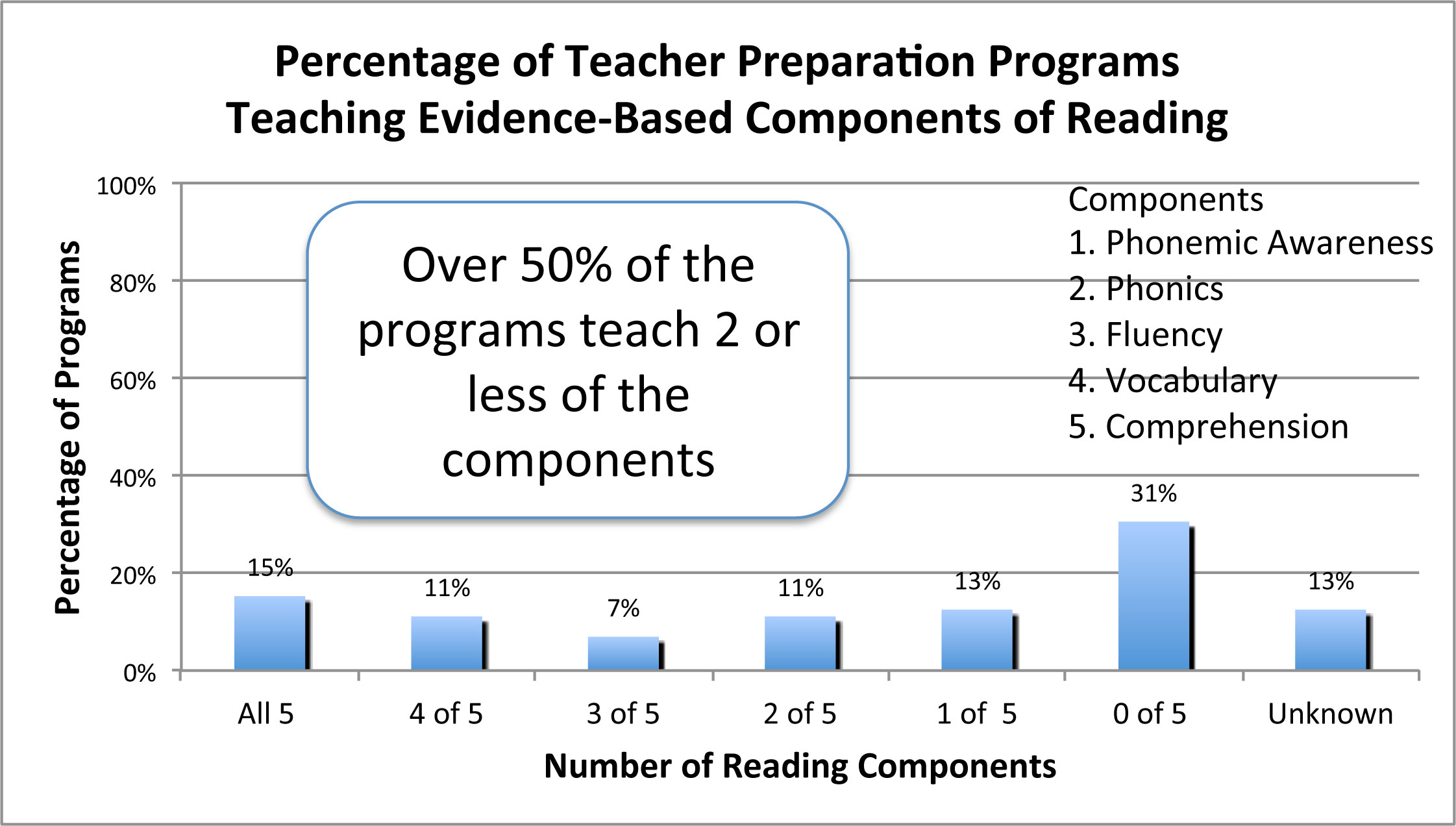How effective are teacher-training programs at teaching the skills of reading?
Why is this question important? Given the importance of reading in receiving a quality education, it is essential that teacher preparation programs provide effective training in the core skills that comprise a scientific-based reading model. Teachers who have not been taught the five components of reading increase the likelihood that their students may not master the reading skills that are essential to success in future grades
See further discussion below.

Source(s): What Education Schools Aren't Teaching About Reading and What Elementary Teachers Aren't Learning
Result(s):
- Only 15% of the sampled schools were providing training in all of the components of effective reading training.
- Recent efforts to increase evidence-based reading practices in the curriculum of reading training has resulted in only 41% of courses meeting criteria and only 9% devoting time to the teaching of the science of reading.
- The fact that the National Council for Accreditation of Teacher Education accredited a program did not increase the likelihood that the school would teach scientifically based reading.
- The teaching of phonics was the most frequently taught component of reading.
- Much of current reading instruction is incompatible with the science of reading.
- Teacher educators often portray the science of reading as an approach that is no more valid than others.
- Despite the vast amount of research conducted in the area of reading, the study could not derive an effect size for vocabulary or reading comprehension. The meta-analysis that were available in these areas did not meet the criteria established by the National Reading panel.
Implication(s): Reading scores are not keeping pace with our national expectations as as is clear from the National Assessment of Educational Progress (NAEP) scores. This has happened despite the fact that reading is the most rigorously researched skill in the field of education. We currently have a considerable evidence base for effective reading and the core components of effective teaching of reading. Unfortunately, teacher preparation programs frequently neglect to teach these skills to new teachers and view the science of reading as just one of many methods for teaching reading. An important strategy for improving reading scores should begin with adequately preparing teachers with the skills to effectively teach this most important of skills.
Author(s): Kate Walsh, Deborah Glaser, and Danielle Dunne Wilcox
Publisher(s): National Council on Teacher Quality, 2006
Study Description: Despite 60 years of rigorous research into what works in the field of teaching reading, teacher preparation schools fail to teach the fundamental components of reading to teachers. The National Reading Panel report in 2000 called for the explicit and systematic teaching of phonemic awareness, phonics, guided oral reading, direct and indirect vocabulary building, and exposure to reading comprehension strategies. This study attempts to identify what a representative sample of 72 American teacher preparation programs are offering prospective teachers.
Definition(s):
- Phonemic awareness: The ability to focus on and manipulate the smallest units in a language that convey a distinction in meaning.
- Phonic instruction: Helping children acquire knowledge of the alphabetic system to decode new words, and to recognize familiar words accurately and automatically.
- Fluency: The ability to read text with speed, accuracy, and proper expression.
- Comprehension: Understanding the meaning of a written text for the reader derived from a particular text, allowing the reader to effectively interact with the text without assistance.
Citation: Walsh, K., D. Glaser, and D. D. Wilcox, 2006. What Education Schools Aren't Teaching About Reading and What Elementary Teachers Aren't Learning. Washington, DC: National Council on Teacher Quality (NCTQ).
